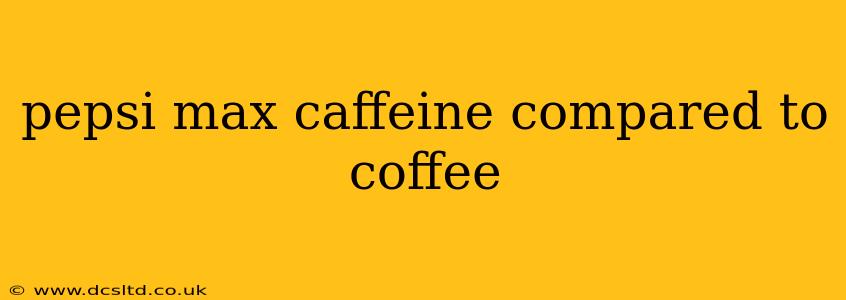For caffeine lovers seeking a refreshing alternative to coffee, Pepsi Max often enters the conversation. But how does the caffeine content of Pepsi Max stack up against a typical cup of joe? This detailed comparison will explore the caffeine levels in both beverages, examining their effects and potential considerations.
How Much Caffeine is in Pepsi Max?
Pepsi Max, a diet cola, contains caffeine to provide that familiar pick-me-up. A standard 12-ounce can of Pepsi Max typically contains around 30-40 mg of caffeine. The exact amount can vary slightly depending on factors like manufacturing processes and regional variations. It's important to note this amount is significantly lower than that found in coffee.
How Much Caffeine is in Coffee?
The caffeine content in coffee is far more variable than in Pepsi Max. This depends on several factors, including:
- Type of bean: Arabica beans generally have less caffeine than Robusta beans.
- Brewing method: Espresso typically has a higher caffeine concentration per ounce than drip coffee. French press coffee also tends to have more caffeine than drip coffee.
- Roast level: The roast level doesn't significantly impact caffeine content.
- Bean-to-water ratio: A stronger brew will naturally contain more caffeine.
- Cup size: An 8-ounce cup of coffee will have less caffeine than a 16-ounce cup.
A standard 8-ounce cup of brewed coffee contains roughly 80-100 mg of caffeine. However, a large 16-ounce cup could easily contain double that amount, or even more. Specialty coffee drinks, like lattes or cappuccinos, can also have significantly higher caffeine levels due to the addition of espresso shots.
Pepsi Max Caffeine vs. Coffee: A Direct Comparison
The following table summarizes the caffeine differences:
| Beverage | Caffeine Content (approx.) |
|---|---|
| 12 oz Pepsi Max | 30-40 mg |
| 8 oz Coffee | 80-100 mg |
| 16 oz Coffee | 160-200 mg |
As you can clearly see, coffee generally packs a more potent caffeine punch than Pepsi Max. For those seeking a milder caffeine boost, Pepsi Max could be a suitable option.
Is Pepsi Max a Good Substitute for Coffee?
Whether Pepsi Max is a good coffee substitute depends entirely on individual preferences and needs. If you're looking for a significant caffeine boost, coffee is a better choice. However, Pepsi Max might be preferable for those who:
- Prefer a sweeter, less bitter taste: Coffee's bitterness can be off-putting to some.
- Need a lower caffeine intake: Pepsi Max offers a milder caffeine experience.
- Are sensitive to coffee's other compounds: Some individuals find coffee causes digestive upset or anxiety. Pepsi Max may be a better alternative in such cases.
Remember to always check the caffeine content of your specific Pepsi Max and coffee brands. Individual variations can occur.
Does Pepsi Max Have Other Stimulants Besides Caffeine?
No, Pepsi Max's primary stimulant is caffeine. While other ingredients are present, they don't contribute significantly to its stimulating effects.
What are the Side Effects of Too Much Caffeine from Pepsi Max or Coffee?
Excessive caffeine consumption, whether from Pepsi Max or coffee, can lead to several unpleasant side effects, including:
- Anxiety and nervousness
- Insomnia
- Restlessness
- Upset stomach
- Rapid heartbeat
- Headaches
Moderation is key to enjoying the benefits of caffeine without experiencing negative side effects.
Can I Mix Pepsi Max and Coffee?
While you can mix Pepsi Max and coffee, it's generally not recommended. The resulting taste is often unappealing to most people, and it doesn't enhance the benefits of either beverage.
This comparison provides a clear overview of Pepsi Max and coffee's caffeine content. Ultimately, the best choice depends on your individual needs and preferences. Remember to consume both beverages responsibly.
